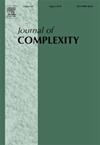具有一般损失函数的在线结果加权学习
IF 1.8
2区 数学
Q1 MATHEMATICS
引用次数: 0
摘要
追求个体化治疗规则在精准医学中产生了巨大的兴趣,因为它有可能优化不同治疗反应的患者的临床结果。结果加权学习是一种备受关注的方法,它通过在加权分类框架下利用每个患者的独特特征来估计最佳的个性化治疗规则。然而,传统的离线学习算法一次处理所有可用数据,由于其庞大的数量,在应用于高维电子健康记录数据时面临局限性。此外,精准医疗的动态特性要求学习算法能够有效地处理以顺序方式到达的流数据。为了克服这些挑战,我们提出了一个将结果加权学习与在线梯度下降算法相结合的新框架,旨在增强精准医疗实践。我们的框架提供了与在线结果加权学习算法相关的学习理论的全面分析,考虑到一般的分类损失函数。我们首次建立了这些算法的收敛性,提供了显式的收敛率,同时假设多项式衰减的步长,有(或没有)正则化项。我们的研究结果将在线分类扩展到在线结果加权学习,为处理流输入-输出-奖励类型数据的学习算法提供了理论基础。本文章由计算机程序翻译,如有差异,请以英文原文为准。
Online outcome weighted learning with general loss functions
The pursuit of individualized treatment rules in precision medicine has generated significant interest due to its potential to optimize clinical outcomes for patients with diverse treatment responses. One approach that has gained attention is outcome weighted learning, which is tailored to estimate optimal individualized treatment rules by leveraging each patient's unique characteristics under a weighted classification framework. However, traditional offline learning algorithms, which process all available data at once, face limitations when applied to high-dimensional electronic health records data due to its sheer volume. Additionally, the dynamic nature of precision medicine requires that learning algorithms can effectively handle streaming data that arrives in a sequential manner. To overcome these challenges, we present a novel framework that combines outcome weighted learning with online gradient descent algorithms, aiming to enhance precision medicine practices. Our framework provides a comprehensive analysis of the learning theory associated with online outcome weighted learning algorithms, taking into account general classification loss functions. We establish the convergence of these algorithms for the first time, providing explicit convergence rates while assuming polynomially decaying step sizes, with (or without) a regularization term. Our findings present a non-trivial extension of online classification to online outcome weighted learning, contributing to the theoretical foundations of learning algorithms tailored for processing streaming input-output-reward type data.
求助全文
通过发布文献求助,成功后即可免费获取论文全文。
去求助
来源期刊

Journal of Complexity
工程技术-计算机:理论方法
CiteScore
3.10
自引率
17.60%
发文量
57
审稿时长
>12 weeks
期刊介绍:
The multidisciplinary Journal of Complexity publishes original research papers that contain substantial mathematical results on complexity as broadly conceived. Outstanding review papers will also be published. In the area of computational complexity, the focus is on complexity over the reals, with the emphasis on lower bounds and optimal algorithms. The Journal of Complexity also publishes articles that provide major new algorithms or make important progress on upper bounds. Other models of computation, such as the Turing machine model, are also of interest. Computational complexity results in a wide variety of areas are solicited.
Areas Include:
• Approximation theory
• Biomedical computing
• Compressed computing and sensing
• Computational finance
• Computational number theory
• Computational stochastics
• Control theory
• Cryptography
• Design of experiments
• Differential equations
• Discrete problems
• Distributed and parallel computation
• High and infinite-dimensional problems
• Information-based complexity
• Inverse and ill-posed problems
• Machine learning
• Markov chain Monte Carlo
• Monte Carlo and quasi-Monte Carlo
• Multivariate integration and approximation
• Noisy data
• Nonlinear and algebraic equations
• Numerical analysis
• Operator equations
• Optimization
• Quantum computing
• Scientific computation
• Tractability of multivariate problems
• Vision and image understanding.
 求助内容:
求助内容: 应助结果提醒方式:
应助结果提醒方式:


